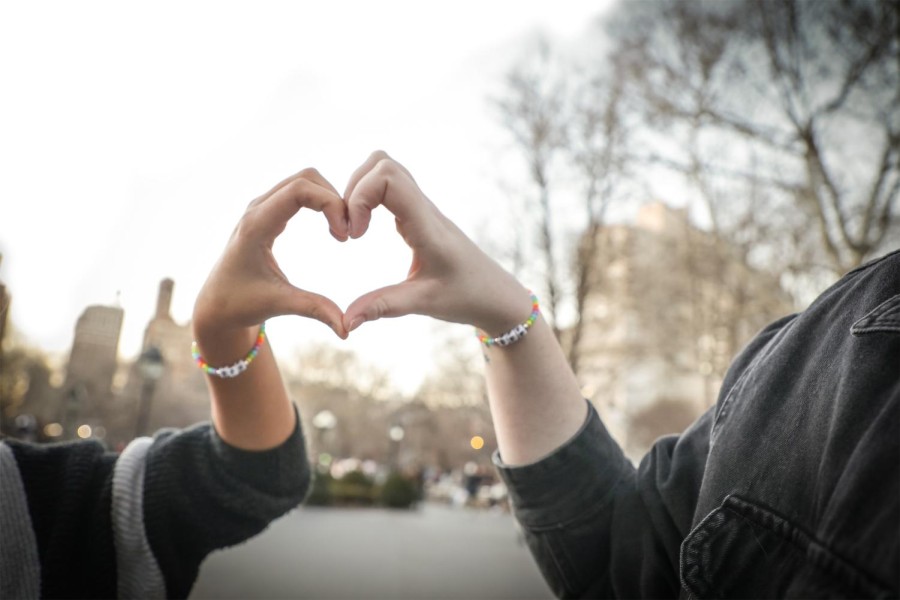I’ve never had a significant other, but I’ve always adored Valentine’s Day. Beyond my lifelong obsession with the color pink, and my affinity for hearts, chocolate, Cupid and flowers, I have always loved the holiday that celebrates love.
When we were in elementary school, Valentine’s Day was all about picking the best boxed set of 24 valentines sporting your favorite characters; my personal favorite packs were Twilight, Hello Kitty and Camp Rock. We had a special Secret Valentine lunch at my school, where we were assigned a random classmate — secret Santa-style. We all brought lunches for our Secret Valentine, full of their pre-selected, favorite items, and ate together at a picnic. I remember being sick on Feb. 14 in sixth grade, and missing the coveted Secret Valentine lunch. I was devastated when I heard my valentine had brought Cool Ranch Doritos, which I was never allowed to eat at home.
As I got older and entered high school, then college, Valentine’s Day became less about the hearts and the boxed cards, and more about whether or not you had someone to spend it with. I remember some of my classmates complaining, at the ripe old age of 15, about how they were going to be spending the night alone and without a date — which to them was an absolute tragedy, and proof that they were a complete loser.
I was puzzled. I was perfectly content to continue making heart-shaped cards for my closest friends, and watch rom-coms while gorging ourselves on See’s Candies.
When we reach adolescence, the mysterious and forbidden floodgates of dating burst open, and the opportunity for romantic love trumps the centrality of platonic love in our lives. When we’re younger, the greatest loves in our lives are our family members and friends. Of course, many of us who are past puberty still consider these to be the greatest source of love in our lives. However, the societal importance that we place on romantic love is egregiously overblown.
I consider myself to be a hopeless romantic. I am enamored with love stories, from the classics of “When Harry Met Sally” and “Pride and Prejudice” to the fanfiction I grew up with, which gave me the opportunity to pore over countless scenarios featuring Percy and Annabeth from “Percy Jackson,” and all my favorite OTPs — one true pairings.
I have no agenda against romantic love, and I actually spend a good portion of my free time consuming and daydreaming about my own potential friends-to-lovers arc. But after I reached adulthood, I felt the pressure to succumb to romance as the primary source of love in my life, and felt disparaged. We’ve all been in the situation in which a friend is in the honeymoon stage of dating someone, and it can sometimes feel like you’ll never see them again.
Of course, getting to know the person you’re getting with is important. Dating plays a crucial role in personal growth and development, and falling in love with a partner can be one of the most fulfilling parts of a person’s life. Just look at our societal obsession with weddings — two people committing to spend the rest of their lives together, bound by love, for as long as they both shall live. Despite its hopelessly sappy nature, it’s truly incredible how much commitment people can have for each other when bound by amorous love.
Perhaps I am fixated on the importance of platonic love because I am a child of divorce. Maybe this has made me naturally more wary and skeptical of the commitment of everlasting romantic love through marriage. My mom was single for nearly 15 years of my life, and while I’m sure she would have appreciated an extra set of hands when wrangling my sister and me, she always said she never needed a romantic partner for her life to be full.
The reason my mom felt fulfilled in her life was because she had an abundance of platonic love. We have a very tight-knit family that lives geographically close, and we are religious about our weekly dinners and get-togethers. She also has a supportive group of friends composed of single, divorced and married women, all of whom rely on each other and go out for dinners and drinks. These friends have been with my mom through her singledom, her divorce and her second marriage. They, along with our family, have been a consistent source of love and support, regardless of the presence of a romantic partner.
As we progress into our 20s, it’s normal for friendship to take a backseat in the pursuit of a partner, sometimes making us ditch a night out with friends for a hookup from Bumble.
Like relationships, friendships take work. Even the closest of friendships require time and effort to be sustainable. We should start treating our friendships like our romantic relationships: setting aside time in our schedule to call, check in and really spend quality time with those we love.
Having to make the decision to put a little more work into your friendship does not mean that it was lackluster to begin with, and when you recommit yourself to your platonic loved ones, you may find that your stream of love will flow more powerfully than ever before.
Think of it as a renewal of vows. Even though Valentine’s Day has come and gone, continue to take the time to appreciate all the forms of love in your life. “Parks and Recreation” popularized Galentine’s Day, and the occasion serves as a reminder to value all the people we love who are not our romantic partners.
And, if you are lucky enough to be in a romantic relationship, remember that it never hurts to be well-rounded. Let’s bring back the boxed set of valentines, and pass them out to everyone we love. But what do I know? I’m just a hopeless romantic who’s never been in love.






















































































































































